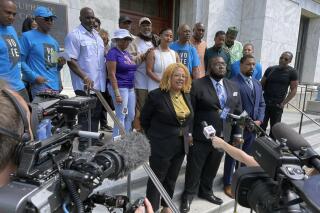Court: Louisiana unanimous jury requirement not retroactive

FILE - Attorneys and backers of an effort to make a ban on non-unanimous jury verdicts retroactive in New Orleans gather on the steps of the state Supreme Court building, Tuesday, May 10, 2022, after the court heard arguments. Prohibitions against non-unanimous jury convictions — outlawed by Louisiana voters in 2018 and, later, by the U.S. Supreme Court — do not have to apply retroactively to earlier convictions, Louisiana’s highest court ruled Friday, Oct. 21, 2022. (AP Photo/Kevin McGill, File)
NEW ORLEANS (AP) — Prohibitions against nonunanimous jury convictions — outlawed by Louisiana voters in 2018 and, later, by the U.S. Supreme Court — do not have to apply retroactively to earlier convictions, Louisiana’s highest court ruled Friday.
The ruling came in the case of Reginald Reddick, convicted of murder by a 10-2 jury vote in 1997, but the court acknowledged it had implications for hundreds of others convicted with 10-2 or 11-1 jury votes.
In 2018, Louisiana voters approved a constitutional amendment prohibiting nonunanimous verdicts in trials for crimes committed after Jan. 1, 2019. At the time, Louisiana was one of only two states allowing such verdicts.
In 2020, the U.S. Supreme Court ruled that nonunanimous verdicts were unconstitutional, broadening the effect of the state constitutional amendment.
But in 2021, the Supreme Court made clear in a case known as Ramos v. Louisiana that its decision against nonunanimous verdicts applied only to future cases and cases in which the defendants’ appeals had not been exhausted.
Friday’s state high court majority ruling by Justice Scott Crichton cited the Ramos case and other jurisprudence in determining that neither federal nor state law required a retroactive application of the prohibition.
Crichton’s opinion acknowledged that provisions for nonunanimous verdicts date back to the late 19th century and are believed to have been a way to undermine Black participation on juries. But he said a provision allowing 10-2 verdicts was included a new state constitution adopted in 1974 and “there are racially neutral, legitimate, and rational arguments justifying a non-unanimous jury rule.”
Four other justices — John Weimer, William Crain, Jay McCallum and Jefferson Hughes — were in the majority.
Justice Piper Griffin dissented. “That the Louisiana Constitution of 1974 somehow cleansed the non-unanimous jury system of its racial animus and impact is an untenable position,” she wrote.
Justice James Genovese wrote a partial dissent, saying new trials are warranted in some nonunanimous cases.
“I find that a new trial should be ordered in cases wherein an African American defendant can prove, by a preponderance of the evidence, that an African American juror dissented from the majority voting to convict defendant of the charged crime,” Genovese wrote.
Crichton’s opinion said the number of people imprisoned in the state as a result of nonunanimous verdicts is unclear but is “surely in the hundreds.” One advocacy group estimates there are more than 1,500 incarcerated in the state on such convictions.
In arguments before the state Supreme Court in May, Jamila Johnson, arguing for Reddick, cited the Jim Crow-era history of nonunanimous juries. She argued that unfairness in the Reddick case made the problems with the law “structural in nature,” so it did not matter if the defendant in a particular case was white or that the appellate record is now unclear on the race of the jury members who voted to acquit her client in 1997.
State attorneys had argued against retroactivity, saying judicial efficiency had been the aim of keeping nonunanimous verdicts in the 1974 constitution.
Friday’s ruling was criticized by an organization that had pursued a new trial for Reddick.
“This is a loss for every Louisianian. Our courts must protect our fundamental rights and freedoms,” said a statement from the Promise of Justice Initiative. “Our clients never had a fair shake, and now the Louisiana Supreme Court has declared they never will.”
